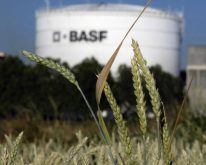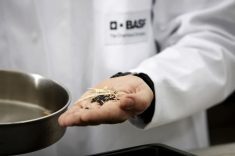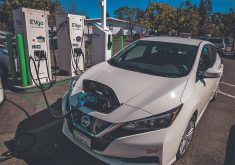Reuters — General Motors and South Korea’s POSCO Chemical will build a $400 million facility to produce battery materials in Canada as the carmaker ramps up plans to produce mainly electric vehicles (EVs) in the future, the companies said Monday.
The plant will produce cathode active material (CAM) for vehicle batteries at Becancour, Que.
Cathodes are the most complex and costly chemical component of an electric vehicle battery, “represent(ing) about 40 per cent of the cost of every EV battery cell,” Scott Bell, GM Canada’s president and managing director, said in a news conference. “We plan to have capacity by 2025 to build a million EVs in North America.”
Read Also

BASF cuts 2025 outlook as tariffs weigh on global economy
Germany’s BASF said on Friday that it was lowering its full-year outlook, citing weaker-than-expected global economic growth and reduced demand for its chemicals due to U.S. tariffs.
The plant’s construction will begin immediately and the goal is to have it running by 2025. Once completed, it will create an estimated 200 jobs, according to a statement. GM aims to produce light vehicles that run exclusively on electricity by 2035.
The CAM produced at the plant will be used to make GM’s Ultium batteries that will power the company’s EVs, such as the Chevrolet Silverado EV, GMC Hummer EV and Cadillac LYRIQ.
GM’s Ingersoll, Ont. factory will launch EV production later this year, Bell said.
Both the federal and Quebec provincial governments are working with GM and POSCO, the companies said, though details were not released.
Rich in key materials for EV battery production — including lithium, graphite, cobalt and nickel — Canada has been wooing battery makers to safeguard the future of its car manufacturing industry as the world seeks to cut emissions.
GM’s is the second CAM plant announcement for Becancour in less than a week. On Friday, German chemical company BASF said it was planning one there, too.
BASF said its facility at Becancour will produce and recycle CAM, starting in 2025, to serve electromobility markets in Canada, the U.S. and Mexico, according to a statement.
BASF last September predicted its battery materials revenue would reach more than 1.5 billion euros (C$2.1 billion) by 2023 and more than seven billion euros by 2030 as electric vehicle production surges.
BASF, in partnership with Japan’s Toda Kogyo Corp., already produces CAM at two locations in North America — in Ohio and Michigan — including nickel cobalt aluminum oxide and nickel cobalt manganese oxide.
Federal Industry Minister Francois-Philippe Champagne said that Becancour will become a hub for the country’s EV battery “ecosystem,” linking Quebec to Canada’s automotive sector heartland in Ontario.
Ontario is geographically close to U.S. automakers in Michigan and Ohio, and GM, Ford and Stellantis have all announced plans to make electric vehicles at factories in Ontario.
More “good news” is on the way, Champagne said, adding that there were “very live discussions” under way about building a battery factory in Canada.
“Starting from this announcement, we will be integrated in the global supply chain for cars in North America,” he said.
— Reporting for Reuters by Aishwarya Nair in Bangalore, Steve Scherer in Ottawa and Ludwig Burger in Frankfurt.














